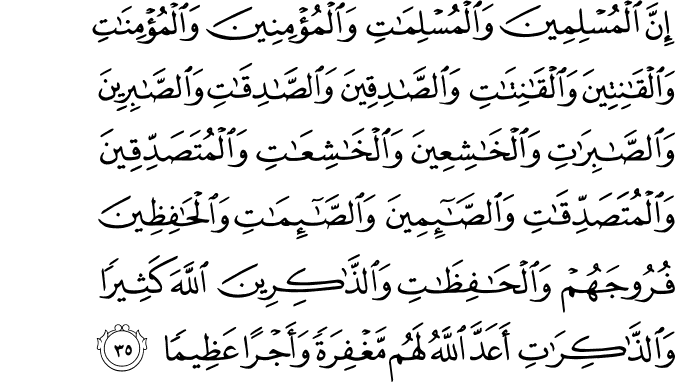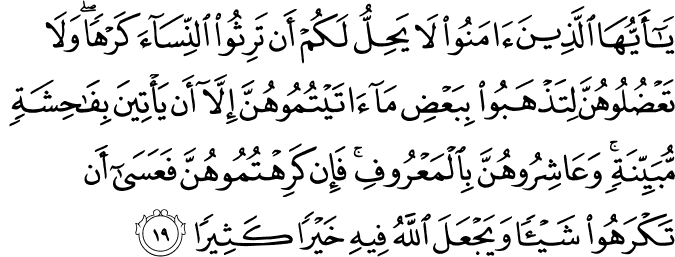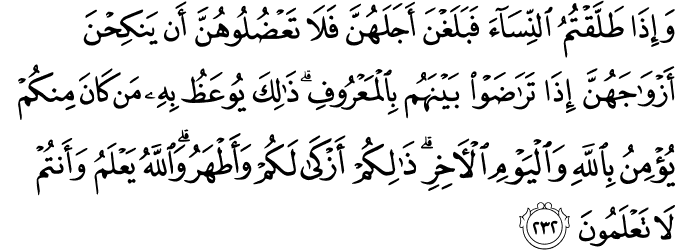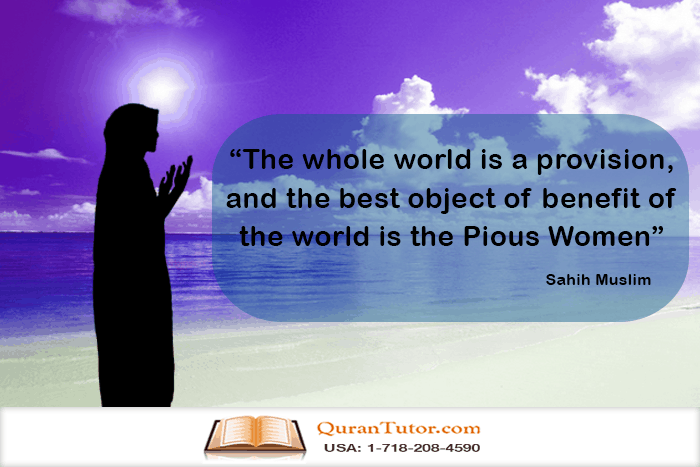The Major Roles of Women in Islam and Society
There were times in the human history when only men were considered the center of creation and universe, while the women were considered lesser beings with no human or social rights whatsoever and who only served as a means of sexual gratification and subservience to men. However, the scenario was first changed fourteen hundred years ago when Islam appeared in the land of Arabia.
From its initial days, Islam worked on creating equality among people and tried to eliminate the different barriers created by people that distinguished them from one another and let them feel superior or inferior. Among the different segregations in the society, the one Islam targeted the most was women segregation, who at that time were considered a different part of the society with no living standards whatsoever. Islam in order to create a peaceful and balanced society entailing good Muslims, considered women an equal entity and claimed their status as a productive and imperative part of the society and did whatever possible to ensure that women experienced and enjoyed the same respect in society like men.
Considering it a moral obligation, today The Online Quran Tutor Academy has decided to highlight the core roles of Women in an Islamic society so that we can understand the significance of the status given to the women by the Allah Almighty. However, before going on with the kind of role and status women enjoy in an Islamic society, it is imperative that the role and plight of women prior to Islam be discussed.
Women Before Islam:
Before Islam women were considered the lesser being all over the world and in the West woman was considered a symbol of evil and they were called ‘the root of all evil’ in relation to the distorted and manipulated Biblical relation of Adam and Eve. Thus, women at that time in the West were considered base, crude, a tool for sexual gratification and in no way equal to men in any regard.
On the other hand, in Arabia the plight of women was beyond narration where having daughters was considered a shame to the extent that parents would bury their girls alive out of shame. Moreover, they also had no rights and were treated like slaves in the household and had no say in any matter of their life.
The Arrival Of Islam:
With the arrival of Islam things started to change all over the world in general and Arabia in particular regarding the rights of women. Islam identified women as an equal member of the society and gave them their due respect and assigned them roles pertaining to their stature. The biggest example of the rising of women can be seen in Quran, where Allah Almighty addresses both men and women alike pertaining to giving of commandments. An example of which is as follows where Allah Almighty says:

“The Muslim men and Muslim women, the believing men and believing women, the worshipping men and worshipping women, the truthful men and truthful women, the pious men and pious women, the alms-giving men and the alms-giving women, the fasting men and fasting women, the men who are chaste and the women who are chaste, the men who remember Allah much and the women who do likewise, Allah has prepared forgiveness and a great reward for all.” (33:35)
From this ayah of Quran it becomes clear that Allah Almighty has referred to women in the same way as He has referred to men. He has attributed the same qualities of virtuousness and piety with women the same as He has attributed with women. Therefore, for Allah the Great, women are equal to men and women must also posses the same level and kind of virtuousness as men must.
A brief description of the kind of role and reverence Muslim women enjoy in different areas of
1. Social Roles:
At a social level Islam recognize the different roles that women have in society and makes sure that women receive respect and reverence for their place in the society. In Islam, women are great mothers, obedient daughters, caring wives and equal sisters. A few verses and hadiths pertaining to the social roles of women in Islam are discussed below.
A) Mother:
The first and perhaps the most reverend role that Islam associates and assigns with women pertaining to social relations is that of a mother. Islam holds great respect for mother and commends the followers to respect their mothers the most of the struggle she does while raising a kid to its adult age.
Once a Companion asked Prophet Muhammad (PBUH):
“Who is the one most worthy of my car?”
The Prophet (PBUH) replied:
“Your Mother.”
The man asked:
“Then whom?”
He replied:
“Your mother.”
The Companion asked again:
“Then whom?”
He replied”
“Your mother.”
The Companion asked again:
“Then whom?”
He replied:
“Then your father.” (Bukhari)
From this hadith, it is clear that a mother has four times more right on a child compared to a father, which is quite on contrary to the common notions in the world where father being the head of the family enjoys the maximum control and rights.
Pertaining to respecting the parents in their old age, Allah Almighty says in Quran:

“Your Lord has decreed that you worship none but Him and that you be kind to parents. When one or both of them attains old age in your life, say not to them a word of disrespect, nor repel them but address them in terms of honor.” (17:23)
Thus, from this ayah also it is clear that a mother has the same right on the children in the old age as has a father. Therefore, when treating parents with respect and care, no Muslim is allowed to discriminate between father and mother, and must ensure that they both are cared well.
B) Sister And Daughter:
The other role that women have to play in a Muslim society is that of daughters and sisters. Islam ensures that in both these roles women enjoy utmost respect, care and protection. In Islam both male child and female child are equal and a parent is as responsible for the education and upbringing of female children as they are responsible for male children. Moreover, as far as the brother sister relation is concerned, it is respected in Islam and brothers and sisters are to respect and treat each other well. In Quran, Allah Almighty says:

“He bestows female (offspring) upon whom He wills, and bestows male (offspring) upon whom He wills.” (42:49)
Therefore, there should be no discrimination between a male child or a female one and both the children must be educated to respect each other as brother and sister.
C) Wife:
The fourth role that women have to play, which brings respect to them is the role of wives. Islam is the first religion that established the rights of women as wives and associated the element of having a say in filial matters as well as respect with them. Allah Almighty says about wives in Quran in the following way:

“And among His signs is this, that He created wives from among yourselves, that you may dwell in tranquility, with them, and He put love and mercy between your (hearts).” (30:21)
From this ayah of Quran it is clear that Allah Almighty is the one who has provided wives to men, however, the objective of wives is not only to please men, the objective is that both men and women must live in tranquility with each other. Therefore, the love that produces tranquility is put in the heart of both the partners, hence, husband and wife both have the duty of caring and loving each other for a healthy relationship.
Moreover, Allah Almighty also said in Quran:
“They are like a garment to you and you are like a garment to them.” (2:187)
From this ayah as well it becomes clear that women are the caretakers of men in the same way as men are the caretakers of women.
2. Role In Religiousness:
Being virtuous and pious is the other kind of role that women play in the Islamic society. As discussed earlier that in the pre Islamic era, women were considered synonymous with evil, therefore, the abode of virtue and piety was not something that was given to women, hence they lived their life in ignorane and tyranny. However, with the advent of Islam, the old stereotypes were challenged and Islam claimed that women have the same tendency of being virtuous and pious as men do. In Quran, Allah Almighty says:

“O mankind! We created you from a single (pair) of male and female, and made you into nations and tribes, that you may know one another. Verily, the most honorable of you in the sigh of Allah is (the one who is) the most God-fearing.” (49:13)
From this ayah it can be deduced that for Allah Almighty everyone is alike and there is no discrimination when it comes to fearing God and being righteous out of that fear. A Muslim women can be and is as righteous and pious out of the fear of God as is a Muslim man.
At another instance, Allah Almighty says:

“Whoever works righteousness, whether male or female, and has faith, verily, to him will We give a life that is good and pure, and We will bestow on such their reward according to the best of their actions.” (16:97)
In this ayah again Allah Almighty mentions that people who have faith and do good they will be rewarded without any gender discrimination. Therefore, being a woman in Islam does not make a person less competitive pertaining to virtue and piety compared to men. Hence, women have to play their role in achieving piety and virtuousness in society and propagate it to others as well.
3. Role In Matrimonial Relationship:
The common misconception about Islam is that people think that it is a male dominated religion where man enjoys authority over women, especially when it comes to matrimonial relationship. The fact is quite contrary, where women have an equal stake in the matrimonial relationship and has her say in matters of the relationship.
The first thing that shows the rights Islam has given to women pertaining to their matrimonial role is the freedom of marrying someone out of their consent. Therefore, the practice of forcing women to marry someone against their will is not Islamic at all.
Secondly, the attribute of compromise is associated only to women in the world of today with regards to matrimonial relationship. The fact is contrary in Islam, where Islam says that both man and wife have to work towards bettering of relationship and in this regard men should also compromise the way women do. In Quran Allah Almighty says:

“….Live with them (wives)honorably (kindness). If you hate them, it may be that you hate a thing and Allah brings through it a great deal of Good.” (4:19)
This ayah clearly explains that compromise is not only the duty of wife, rather a man also has to be patient in a matrimonial relationship and compromise for better with the other counterpart.
Moreover, Islam also gave the right of divorce to women fourteen hundred years ago, which enables women to ask for divorce or the two partners can reach a decision after mutual consent. Quran says in this regard:

“Should they (husband and wife) wish to separate from each other in agreement and upon consultation then they can do so blamelessly.” (2:232)
Thus, women have a significant role to play in the matrimonial relationship as well, and the conception that women are to be married wherever the parents will or they cannot opt for getting divorce are wrong and women need to know about this right of theirs so that they can better play their role.
Conclusion:
In a nutshell, it is imperative that a Muslim women understands the rights that Islam has given to her and then in the light of those rights and obligations, she must perform all the social, filial and matrimonial roles with utmost dedication and commitment.









